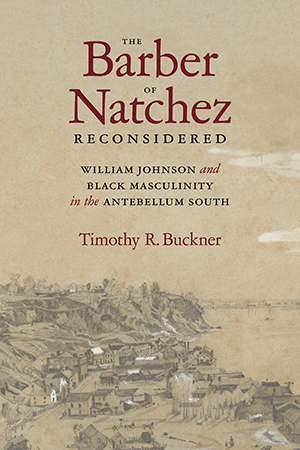
264 pages / 6.00 x 9.00 inches / no illustrations
History / United States - 19th Century | History / African American | Social Studies / Gender Studies
Historians have long considered the diary of William Johnson, a wealthy free Black barber in Natchez, Mississippi, to be among the most significant sources on free African Americans living in the antebellum South. Timothy R. Buckner’s The Barber of Natchez Reconsidered reexamines Johnson’s life using recent scholarship on Black masculinity as an essential lens, demonstrating a complexity to Johnson previously overlooked in academic studies.
While Johnson’s profession as a barber helped him gain acceptance and respectability, it also required his subservience to the needs of his all-white clientele. Buckner’s research counters earlier assumptions that suggested Johnson held himself apart from Natchez’s Black population, revealing instead a man balanced between deep connections to the broader African American community and the necessity to cater to white patrons for economic and social survival.
Buckner also highlights Johnson’s participation in the southern performance of manliness to a degree rarely seen in recent studies of Black masculinity. Like many other free Black men, Johnson asserted his manhood in ways beyond simply rebelling against slavery; he also competed with other men, white and Black, free and enslaved, in various masculine pursuits, including gambling, hunting, and fishing. Buckner’s long-overdue reevaluation of the contents of Johnson’s diary serves as a corrective to earlier works and a fascinating new account of a free African American business owner residing in the prewar South.
Timothy R. Buckner is associate professor of history at Troy University and coeditor of Fathers, Preachers, Rebels, Men: Black Masculinity in U.S. History and Literature, 1820–1945.
“Timothy R. Buckner skillfully examines William Johnson’s life and experiences with this rich case study, serving to illuminate vital issues surrounding race, politics, and power in Natchez, Mississippi, and the Lower South. Buckner’s emphasis on the multifaceted nature of Black manhood in and out of slavery, and on the structural forces that shaped actions and identities in the antebellum South, makes this a critical addition to the field.”—David Stefan Doddington, author of Contesting Slave Masculinity in the American South
“Buckner’s close inspection of the diary of William Johnson provides a nuanced picture of its author and his story. The book corrects interpretative mistakes made by scholars and situates this important primary document within a much-changed and updated historiography on antebellum free Black life, free Black slaveholding, Black and southern masculinity, as well as the prewar frontier and urban South.”—Libra R. Hilde, author of Slavery, Fatherhood, and Paternal Duty in African American Communities over the Long Nineteenth Century
Found an Error? Tell us about it.